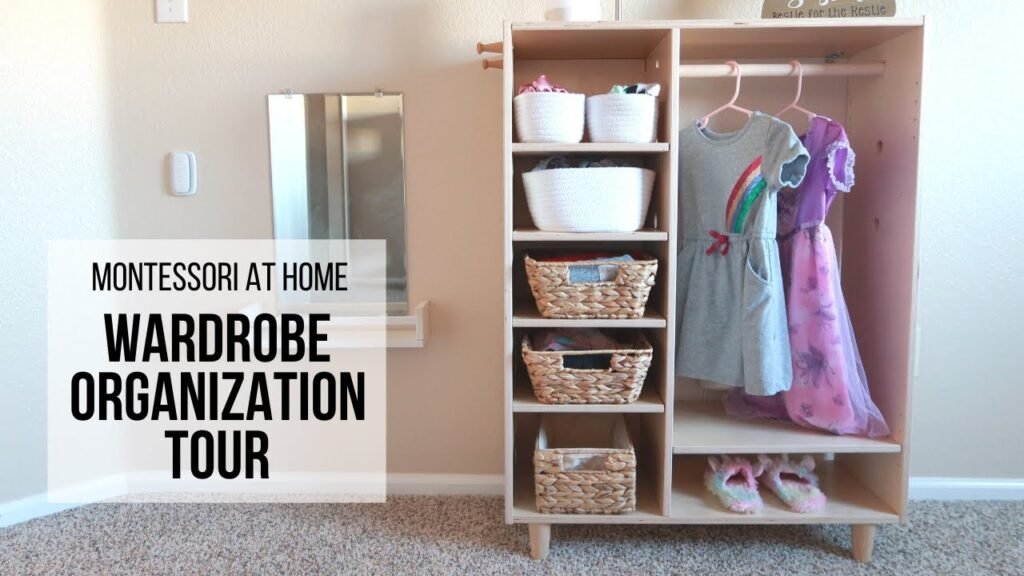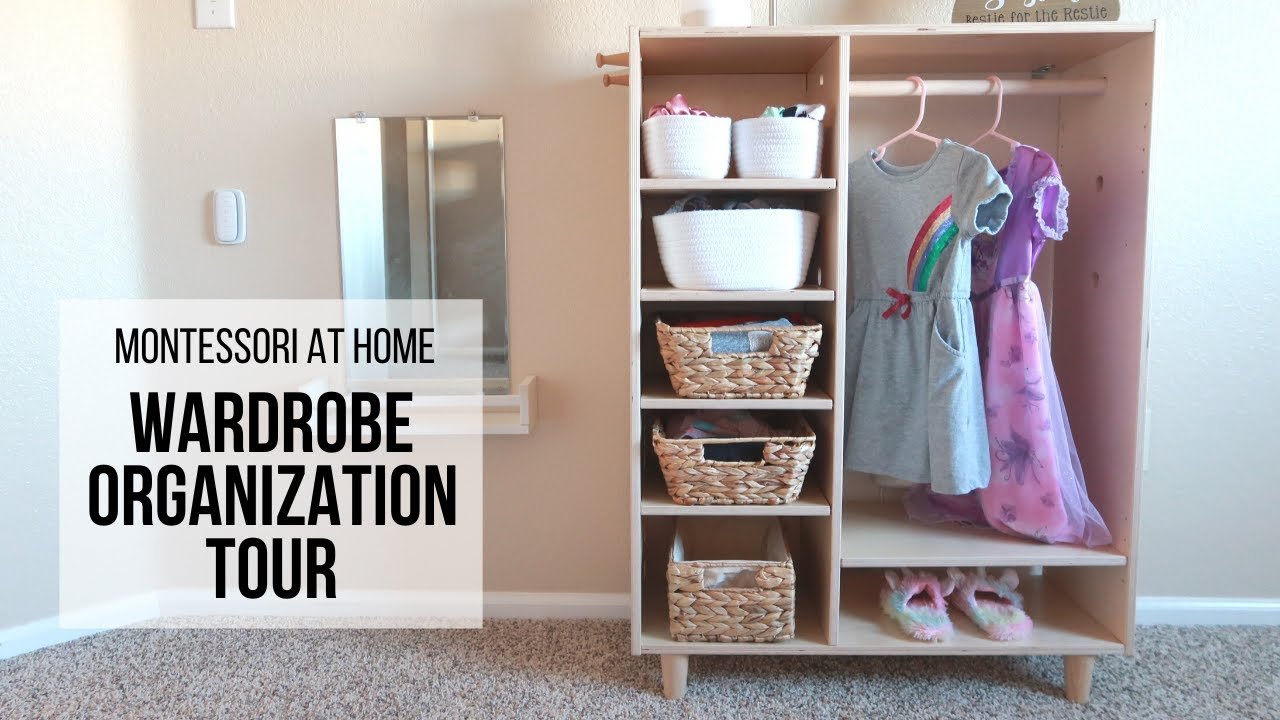Hey, it’s great to meet you! Today, I wanted to share with you a video tour by the Hapa Family on Montessori wardrobe organization. In this video, you’ll find helpful tips on setting up a Montessori wardrobe for toddlers, including examples for a 23-month-old and a 4-year-old. The video also includes a DIY tutorial on an IKEA wardrobe, along with information on additional resources for implementing Montessori at home.
As a parent, helping your child learn self-care skills is essential, and providing independent access to clothing for toddlers is a great way to empower them to make choices and dress themselves. The Hapa Family’s video showcases various options for organizing a Montessori wardrobe, emphasizing that there is no one right way to set it up. Whether it’s using baskets, shelves, or standalone wardrobes, the focus is on giving children the tools they need to develop independence and responsibility in caring for themselves. So, are you ready to transform your child’s wardrobe organization with Montessori principles?
Overview of Montessori Wardrobe Organization
Introduction to Montessori wardrobe organization
Montessori wardrobe organization focuses on providing children with independent access to their clothing, empowering them to make choices and dress themselves. This method aligns with Montessori principles of promoting care of self skills from a young age.
Benefits of Montessori wardrobe setup
Setting up a Montessori wardrobe for children encourages independence, decision-making, and self-care skills. By allowing children to choose and dress their outfits, they develop a sense of autonomy and confidence in their abilities.
Focus on care of self skills
In a Montessori environment, care of self skills play a crucial role in a child’s development. By teaching children how to care for themselves, including dressing independently, they learn essential life skills that will benefit them in the long run.
IKEA Wardrobe DIY Tutorial
Step-by-step guide to setting up an IKEA wardrobe for Montessori use
The video included in this Montessori wardrobe organization tutorial showcases a DIY project using an IKEA four-cube Calyx shelf. By following the detailed steps provided, parents can create a functional and personalized wardrobe setup for their children.
Tips and tricks for organizing clothing and accessories in the wardrobe
Organizing clothing and accessories in a Montessori wardrobe involves thoughtful placement and accessibility for children. Utilizing baskets, drawers, shelves, or standalone wardrobes can help streamline the process and make it easier for children to select their clothing.
Video Details
No sponsorship disclaimer
The Montessori wardrobe organization video by Hapa Family is not sponsored, ensuring that the content and recommendations are unbiased and based on personal experience.
Inclusion of affiliate links in the video description
Affiliate links may be included in the video description to support the channel and provide viewers with additional resources or products related to Montessori wardrobe organization.
Contact email and Instagram handle for business inquiries
For business inquiries related to Montessori wardrobe organization or other content, viewers can reach out to Hapa Family via the provided contact email or Instagram handle.

Empowering Toddlers to Dress Themselves
Importance of providing independent access to clothing for toddlers
Empowering toddlers to choose and dress themselves promotes confidence, decision-making skills, and fosters a sense of independence from a young age.
Benefits of allowing toddlers to choose and dress their own outfits
By allowing toddlers to select their clothing and dress themselves, parents encourage self-expression, creativity, and autonomy within a Montessori framework.
Encouraging independence and decision-making skills in toddlers
Supporting toddlers in learning care of self skills, such as dressing independently, helps develop essential life skills and promotes a sense of accomplishment and self-reliance.
Setting Up Access to Clothing
Options for organizing clothing including baskets, drawers, shelves, and standalone wardrobes
There are various ways to set up access to clothing for children, including utilizing baskets, drawers, shelves, or standalone wardrobes. Each option offers unique benefits and can be customized to fit a child’s preferences and needs.
Customizing wardrobe setup based on child’s preferences
Tailoring the wardrobe organization to suit a child’s preferences, habits, and developmental stage is essential in creating a functional and accessible space for them to independently select their clothing.
Examples of wardrobe organization for different age groups
Providing examples of wardrobe organization for different age groups, such as a 23-month-old toddler and a 4-year-old child, offers practical insights and inspiration for parents looking to implement Montessori principles at home.
Tour of Montessori Wardrobes
Virtual tour of 23-month-old toddler’s wardrobe
The virtual tour of a 23-month-old toddler’s Montessori wardrobe provides a firsthand look at how the setup promotes independence, organization, and accessibility for the child.
Virtual tour of 4-year-old child’s wardrobe
Exploring the organization of a 4-year-old child’s Montessori wardrobe showcases the evolution of wardrobe setup as children grow and develop specific preferences and clothing needs.
Organization tips and strategies shared during the tour
Throughout the Montessori wardrobe tours, valuable organization tips and strategies are shared to help parents optimize their children’s wardrobe spaces and create a functional environment for independent dressing.
Personalize Montessori Wardrobe
No one right way to set up a Montessori wardrobe
There is no singular correct method for setting up a Montessori wardrobe, as the approach can be tailored to each child’s unique needs, space constraints, and available resources.
Adapting organization methods to suit your child’s needs and preferences
Adapting organization methods based on a child’s preferences, habits, and developmental stage ensures that the Montessori wardrobe aligns with their individual abilities and fosters independence effectively.
Creating a personalized and accessible wardrobe space for your child
By personalizing the Montessori wardrobe to suit a child’s interests, daily routines, and clothing choices, parents can create a space that encourages self-reliance, organization, and autonomy.
Additional Resources and E-courses
Information on available resources and e-courses for implementing Montessori at home
Discovering additional resources and e-courses related to Montessori at home can provide parents with further guidance, support, and strategies for incorporating Montessori principles into their daily routines.
Positive discipline parenting techniques and strategies
Exploring positive discipline parenting techniques and strategies can help parents foster a respectful, nurturing, and empowering environment for children, emphasizing mutual respect and effective communication.
Benefits of continued education and support for Montessori parenting
Continuing education and seeking support in Montessori parenting can enhance parents’ confidence, knowledge, and ability to create meaningful learning experiences for their children, promoting holistic development and growth.
Subscribe for More Montessori Tips
Encouraging viewers to subscribe to the Hapa Family channel
By subscribing to the Hapa Family channel, viewers can stay updated on the latest Montessori at home tips, tutorials, and advice, fostering a community of like-minded parents and educators.
Staying updated on the latest Montessori at home tips and advice
Subscribing to the channel ensures that viewers receive regular updates on Montessori at home practices, organization tips, and strategies for promoting independence and self-care skills in children.
Building a community of like-minded parents and educators
Joining a community of like-minded parents and educators through the Hapa Family channel fosters a supportive environment for sharing experiences, seeking advice, and collaborating on implementing Montessori principles at home.
Conclusion
Recap of key points discussed in the Montessori wardrobe organization video
In conclusion, the Montessori wardrobe organization video highlights the importance of promoting independence, self-care skills, and decision-making abilities in children through accessible, personalized wardrobe setups.
Encouragement for parents to implement Montessori principles at home
Parents are encouraged to implement Montessori principles at home by creating functional, child-centered wardrobe spaces that support children’s autonomy, creativity, and self-expression.
Thanking viewers for their support and engagement with the content
Hapa Family appreciates viewers’ support, engagement, and interest in Montessori wardrobe organization, and looks forward to sharing more tips, tutorials, and resources for promoting positive parenting practices and fostering children’s development.

